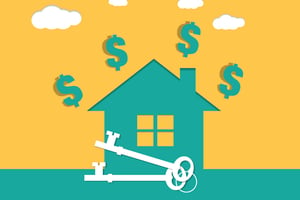
Deciding to purchase a home is exciting and a bit nerve-racking. It’s a big decision that can impact your life and finances for years to come. But it also provides the opportunity to improve your home life and build equity in the property.
One of the most common questions prospective buyers ask is, how much cash is needed upfront? While a first mortgage will handle most of your financing needs, it’s these initial costs that keep homeownership at bay for so many.
The following guide outlines the upfront and ongoing costs prospective homeowners should prepare to cover as they progress through the homebuying process.
Down Payment
The most dreaded words of buying a home – down payment. It’s true that a down payment can be costly, and it’s one of the main reasons more people aren’t homeowners. But new programs and mortgage products have come to life that make down payments much more affordable today.
Generally, you need a 20% down payment on a conventional mortgage to avoid PMI.
- Private Mortgage Insurance (PMI) protects the lender if you cannot make your mortgage payments. Typically, it costs around 0.5% to 1.5% of the loan amount annually and is broken up and added to your monthly payments.
If you don’t mind paying PMI, many lenders are happy to accept lower down payments. Other programs, such as first-time home buyer options or Federal Housing Administration (FHA) loans, are available.
- First-Time Home Buyer Programs: These programs vary by state and might include grants. They often allow borrowers to make down payments as little as 3% of the home’s sale price.
- Federal Housing Administration (FHA) Loans: These loans are insured by the FHA and serviced by mortgage lenders. The down payment is as little as 3.5%, but you’ll be required to pay the Mortgage Insurance Premium (MIP). This is like PMI; however, there is an upfront cost for the first year (1.75% of the home’s sale price).
Example:
To illustrate the variance in costs of a down payment by loan/program type, assume you plan to purchase a $250,000 home.
-
- 20% Down Payment = $50,000
-
- 3% First-Time Home Buyer Program = $7,500
-
- 5% FHA Loan = $8,750 + $4,375 (1.75% MIP Cost) = $13,125
It’s important to keep in mind the benefits a down payment provides.
- Your down payment instantly builds equity in your property.
- The larger your down payment, the less interest you’ll pay over the life of your loan.
- Down payments help decrease the amount financed, resulting in lower monthly payments.
Closing Costs
The next expense you’ll want to prepare for is closing costs. Typically, these will range between 3% to 6% of the home’s sale price (for homebuyers). Sellers also pay closing costs, which are typically more expensive and cover real estate agent fees.
Closing costs for homebuyers include a variety of fees and charges associated with buying the property, such as:
- Lender costs & fees
- Appraisal fee
- Home inspection
- Property survey
- Title search & insurance
- Attorney fees
- Pre-paid property taxes
- Pre-paid homeowner’s insurance
Instead of being responsible for every expense, these costs are grouped together and due at closing on your new home.
Example:
Using the $250,000 home from earlier, the closing costs on this property would range between $7,500 and $15,000.
Moving Expenses
Moving expenses vary greatly depending on whether you’re moving across town or cross-country. Items to consider include:
- Boxes
- Packing materials
- Truck rental
- Moving company
If you’re moving cross-country, it’s wise to obtain multiple quotes and ensure they cover the same services. One might be cheaper because it leaves off certain protections, like insurance coverage.
A significant moving expense that many overlook is time off from work. Try to plan your move around your days off; otherwise, you might eat into your vacation time.
Repairs & Décor
If you’re moving into a home with necessary repairs or upgrades, obtain quotes prior to closing on the property. Ensure these expenses fit into your budget before signing on the dotted line.
For example, if you know the carpet needs to be replaced immediately or the water heater isn’t working properly, you’ll want to have funds set aside before moving in.
When moving from a smaller apartment or home into a larger one, you’ll likely need new furnishings. There is no rule that says you must buy all these items immediately. Instead, make a list of the furnishings you need and slowly decorate over the next several months.
Maintenance Costs
While maintenance is largely ongoing, there are times when the expenses are due upfront. For example, if you’re moving from an apartment to a house, you’ll probably need to figure out how to care for your lawn. That might include purchasing a lawnmower or hiring a lawn service.
We’re Here to Help!
Whether you’re buying your first home or forever home, it’s exciting. Sure, it can be a little stressful at times, but we’re always here to help. Our home loan team is happy to answer all your questions and walk you through the entire homebuying process.
If want to speak with a team member or apply for a first mortgage, please contact us. Stop by any of our convenient branch locations or visit freedomfirst.com/mortgage today.





